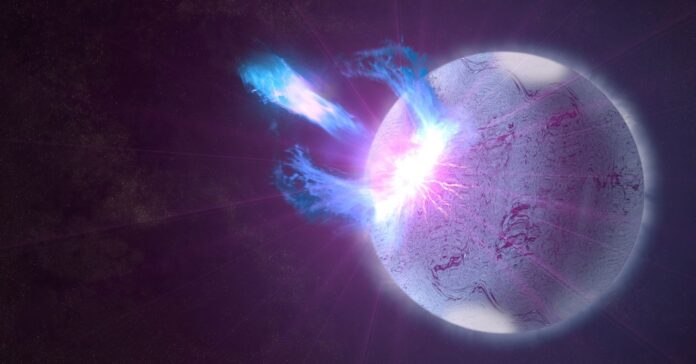A 2d learn about, printed the similar day in Science, shone extra gentle at the mysterious bursts and their selection. This staff of researchers, most commonly at Australian establishments, noticed the farthest and brightest speedy radio burst ever noticed. In not up to a millisecond, it blazed out as a lot power because the solar emits in additional than 16 years, and it did this some 10 billion light-years away. That exceeds the former record-holder’s distance by way of about 4 billion light-years, and it’s 5 occasions extra vigorous, too. This implies that the bursts don’t simply come from the within reach universe.
A global workforce led by way of astronomer Ryan Shannon of the Swinburne College of Generation used Australia’s Sq. Kilometre Array Pathfinder to glimpse this speedy radio burst, which originated when the universe used to be not up to part its present age. “That you’ll be able to have those millisecond indicators that—although no longer completely undisturbed—go back and forth 8 billion years simply to get to Earth is lovely astounding,” Shannon says.
That sign, referred to as FRB 20220610A, is the brightest, or maximum vigorous, speedy radio burst ever detected. Shannon likens the power to a microwave oven, since its frequency vary is the same: The power from that unmarried burst can be sufficient to microwave a bowl of popcorn two times the dimensions of the solar, he says.
A quick radio burst doesn’t go back and forth immediately via house, as a result of house isn’t precisely a vacuum. The sign passes via fuel, which could be turbulent or clumpy, dense or diffuse. It rather distorts the sign, spreading it out or making it noisier. The gravitational pull of a large celestial frame too can deflect the radio waves, a procedure referred to as gravitational lensing. Those distortions embed the burst’s sign with details about the stuff it handed via on its approach to Earth.
A distortion like this gave Shannon and his colleagues their clue that FRB 20220610A almost definitely got here from some distance away. They spotted that the radio sign used to be a little bit off, due to a frequency-dependent time prolong led to by way of the fuel the burst traveled via between its host galaxy and ours.
Those distortions additionally imply that ultrafast flashes may be used as astrophysical probes to review the clouds of fuel and dirt {that a} radio burst passes via between its supply and the Earth, says Jason Hessels, a colleague of Snelders’ on the College of Amsterdam. Those gases are too faint to look, however we will inform the place they’re—or how considerable or clumpy they’re—by way of how they bend the radio indicators. “As a result of those bursts are so brief, it simplest takes a tiny little little bit of fuel between stars and galaxies to distort the radio sign. It may be broadened or scattered or gravitationally lensed,” Hessels says. He calls speedy radio bursts “distinctive gear for learning differently invisible subject matter.”
“The shorter they’re, the extra exactly you’ll be able to do this,” he says.
Altogether, the wide vary of speedy radio bursts cataloged within the two research means that there may well be many types of assets—they may not all be blasting from pulsating magnetars. Some may just come from vibrant pulsars, whose beams are powered by way of their rotation somewhat than magnetic fields. Others may come from black holes feeding on stars whilst emitting jets of fuel that create surprise waves producing radio flashes. This variety may just give an explanation for why some bursts ultimate 1,000,000 occasions longer, or are hundreds of occasions brighter, than others. It will additionally give an explanation for why it’s been so laborious to pin down a unmarried form of supply—as a result of there almost definitely isn’t simply one.
“The varieties of bursts we’re discovering and the puts we’re discovering those assets are turning into increasingly numerous,” Hessels says. “It means that there’s a couple of rationalization. That may make the theorists satisfied, as a result of there are dozens and dozens of theories.”





 #shorts #shortsfeed #nature #youtubeshorts #iciness
#shorts #shortsfeed #nature #youtubeshorts #iciness